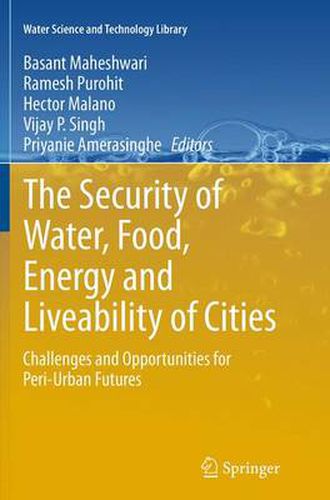Readings Newsletter
Become a Readings Member to make your shopping experience even easier.
Sign in or sign up for free!
You’re not far away from qualifying for FREE standard shipping within Australia
You’ve qualified for FREE standard shipping within Australia
The cart is loading…






This title is printed to order. This book may have been self-published. If so, we cannot guarantee the quality of the content. In the main most books will have gone through the editing process however some may not. We therefore suggest that you be aware of this before ordering this book. If in doubt check either the author or publisher’s details as we are unable to accept any returns unless they are faulty. Please contact us if you have any questions.
The population of cities around the world is growing at an alarming rate, and as a result the landscapes of most cities are going through enormous changes. In particular, fertile agricultural lands at the periphery of cities are being developed without consideration of holistic planning. As such, peri-urban areas, zones of transition from rural to urban land uses located between the outer limits of the urban and the rural environment are experiencing significant losses of agricultural land, increased runoff, and water quality degradation. Concurrently, the demands for water, food and energy are increasing within cities, and unless a balance is struck the liveability of these cities will soon be compromised. The current water and land use changes have serious consequences on lifestyle, environment, health and overall well-being of urban communities. This book therefore helps readers to understand the current issues and challenges and examines suitable strategies and practices to cope with current and future pressures of urbanisation and peri-urban land-use changes.
The book examines a number of critical aspects in relation to the future of cities and peri-urban regions, including the suitability of policies and institutions to sustain cities into the future; impact of current trends in land use change, population increase and water demand; long term planning needs and approaches to ensure the secured future for generations ahead; and strategies to adapt the cities and land uses so that they remain viable and liveable.
The readership of the book will include policy makers, urban planners, researchers, post-graduate students in urban planning and environmental and water resources management and managers in municipal councils.
$9.00 standard shipping within Australia
FREE standard shipping within Australia for orders over $100.00
Express & International shipping calculated at checkout
This title is printed to order. This book may have been self-published. If so, we cannot guarantee the quality of the content. In the main most books will have gone through the editing process however some may not. We therefore suggest that you be aware of this before ordering this book. If in doubt check either the author or publisher’s details as we are unable to accept any returns unless they are faulty. Please contact us if you have any questions.
The population of cities around the world is growing at an alarming rate, and as a result the landscapes of most cities are going through enormous changes. In particular, fertile agricultural lands at the periphery of cities are being developed without consideration of holistic planning. As such, peri-urban areas, zones of transition from rural to urban land uses located between the outer limits of the urban and the rural environment are experiencing significant losses of agricultural land, increased runoff, and water quality degradation. Concurrently, the demands for water, food and energy are increasing within cities, and unless a balance is struck the liveability of these cities will soon be compromised. The current water and land use changes have serious consequences on lifestyle, environment, health and overall well-being of urban communities. This book therefore helps readers to understand the current issues and challenges and examines suitable strategies and practices to cope with current and future pressures of urbanisation and peri-urban land-use changes.
The book examines a number of critical aspects in relation to the future of cities and peri-urban regions, including the suitability of policies and institutions to sustain cities into the future; impact of current trends in land use change, population increase and water demand; long term planning needs and approaches to ensure the secured future for generations ahead; and strategies to adapt the cities and land uses so that they remain viable and liveable.
The readership of the book will include policy makers, urban planners, researchers, post-graduate students in urban planning and environmental and water resources management and managers in municipal councils.